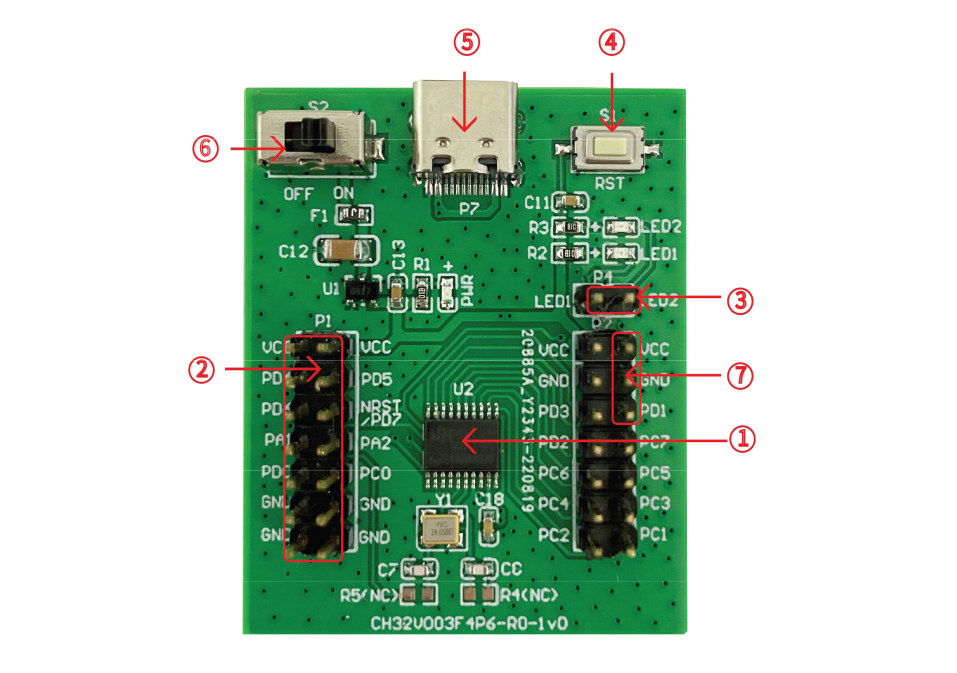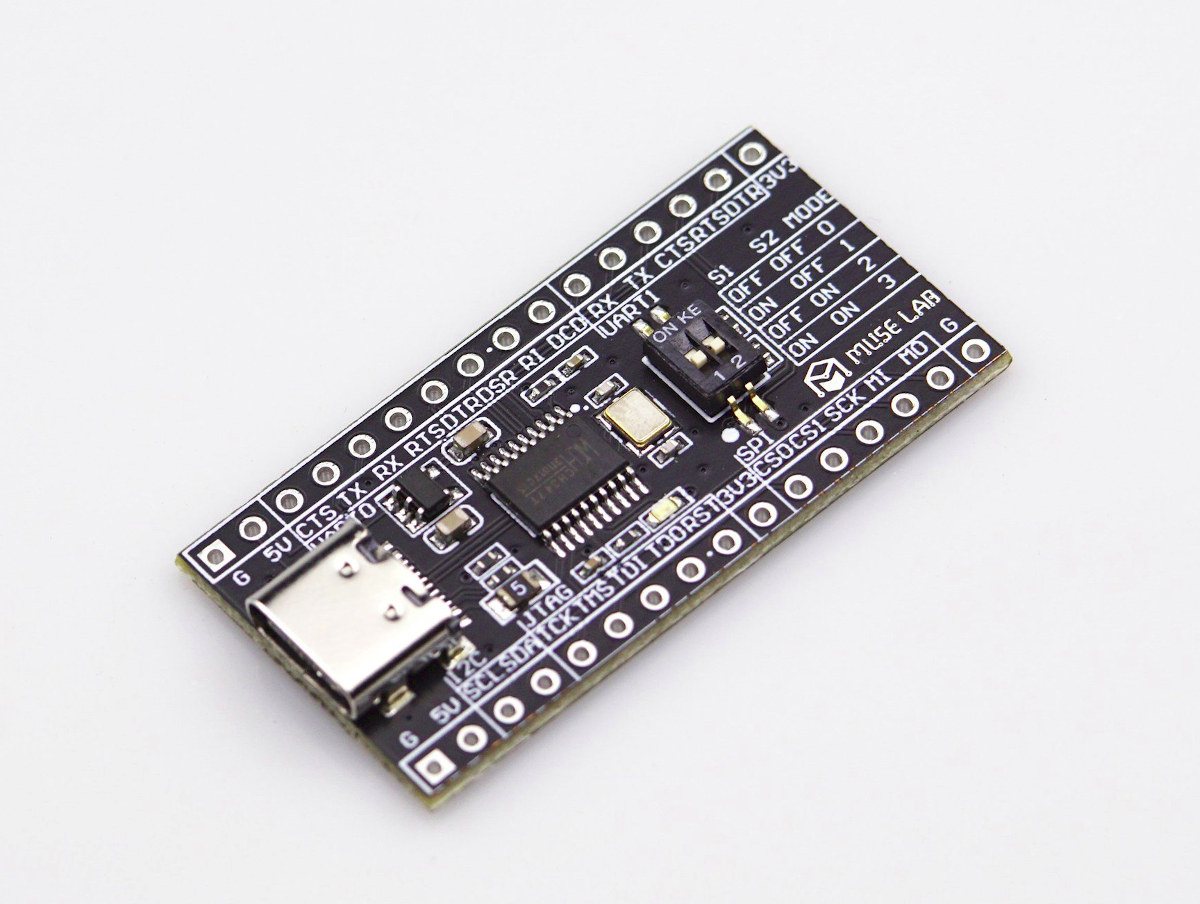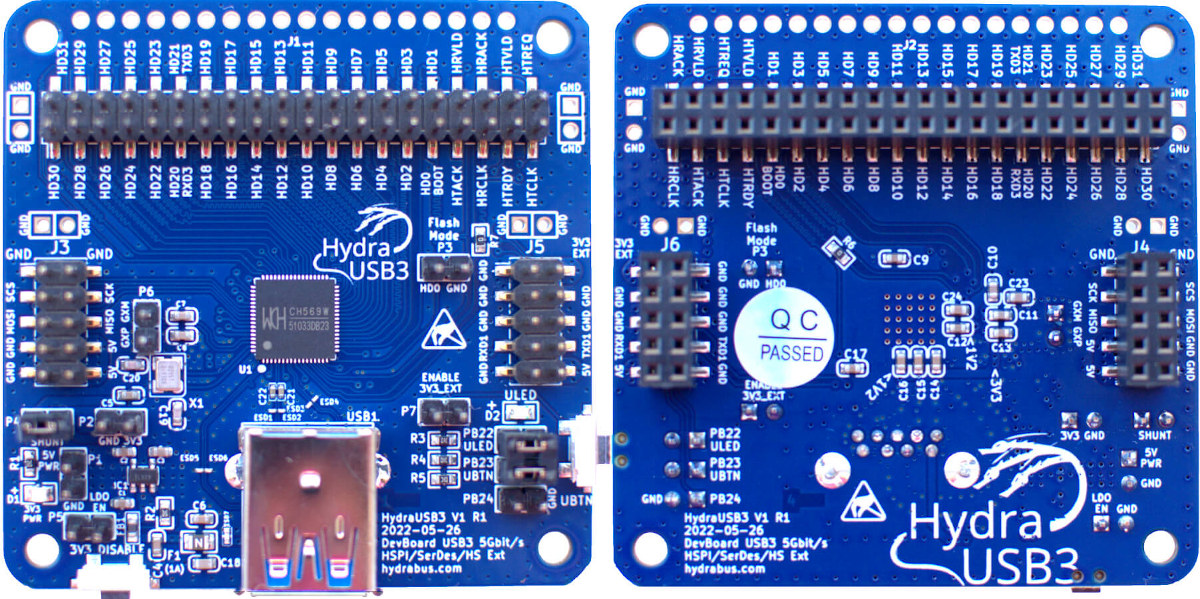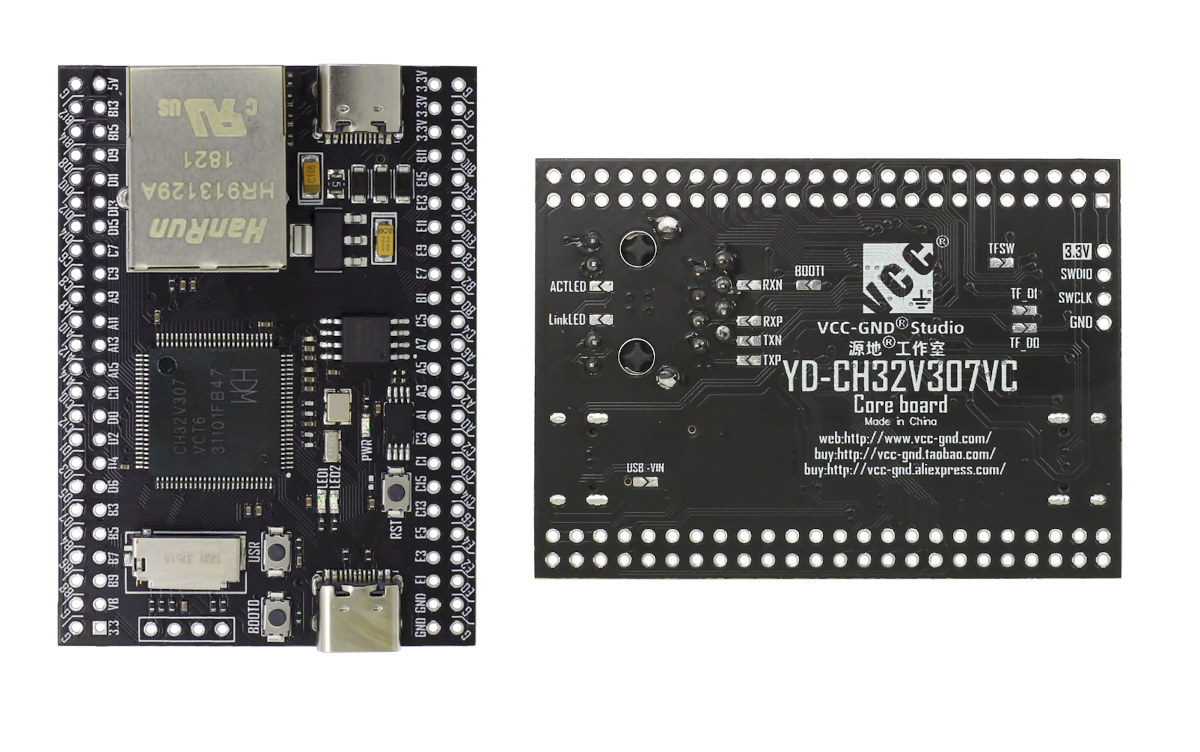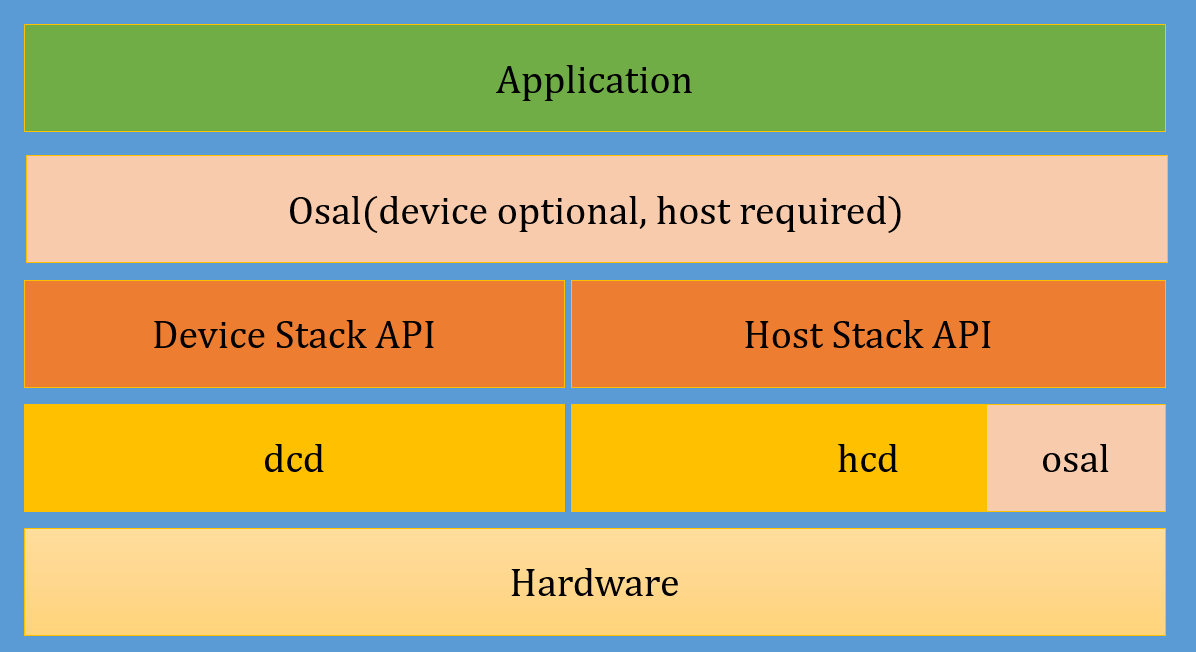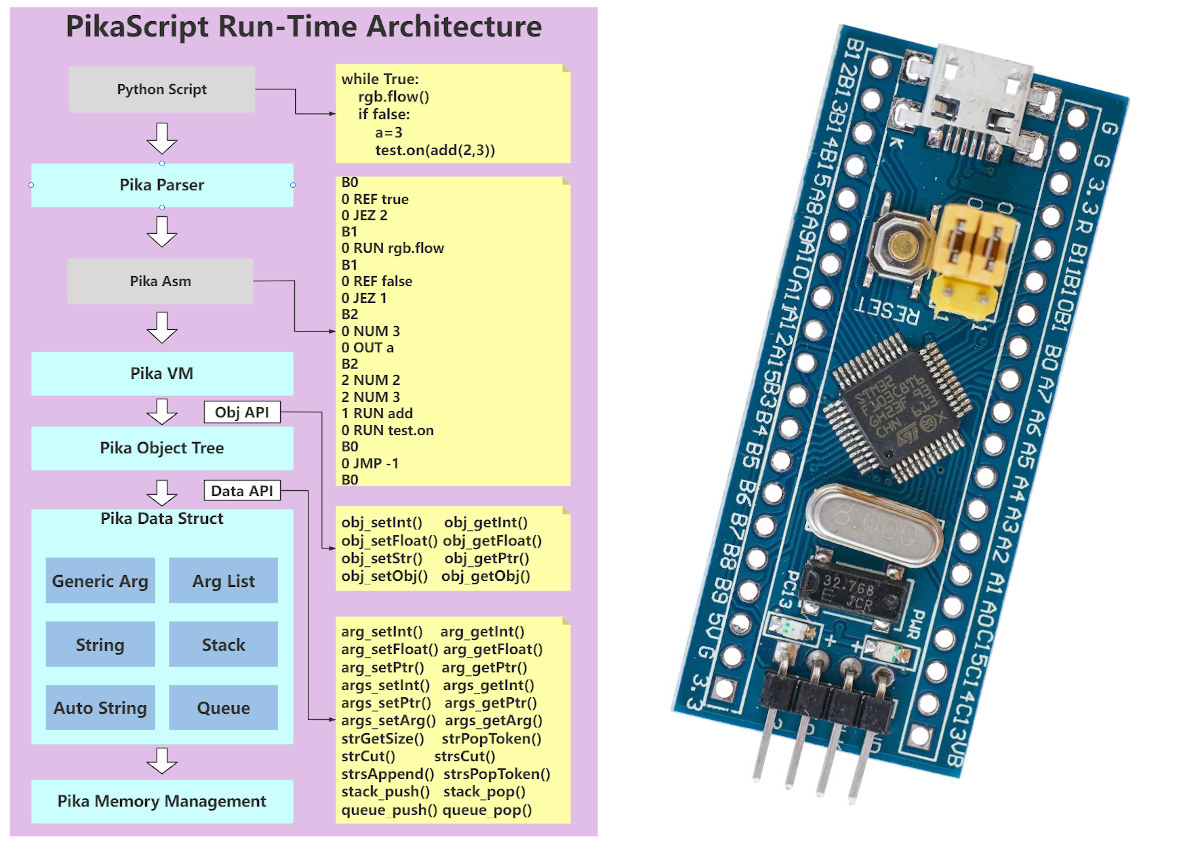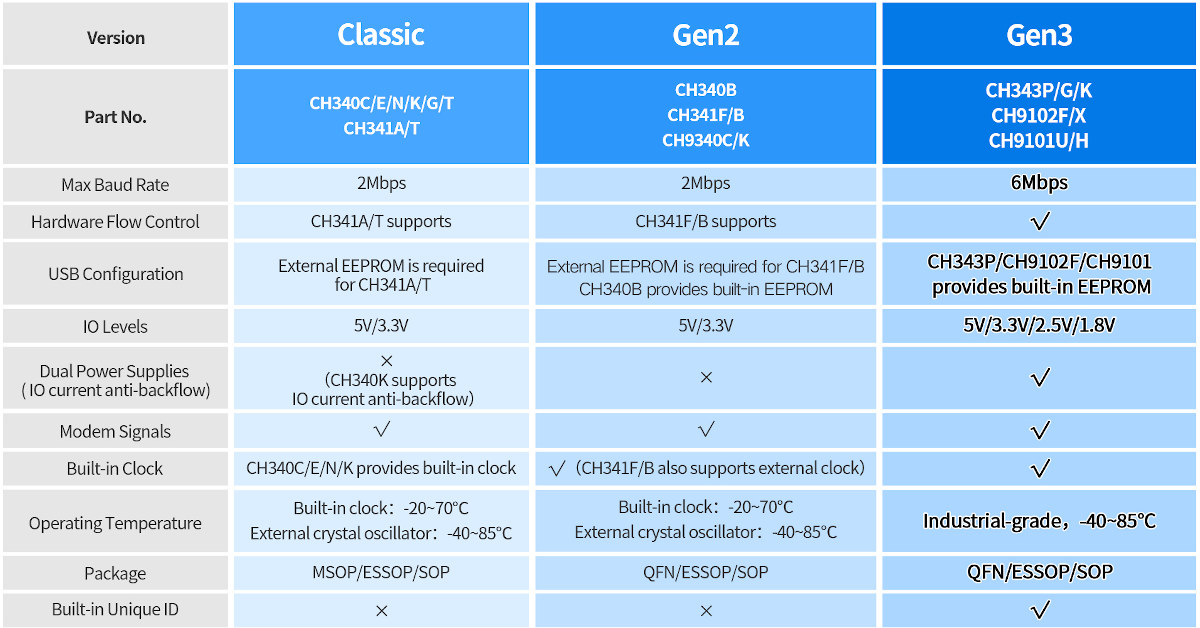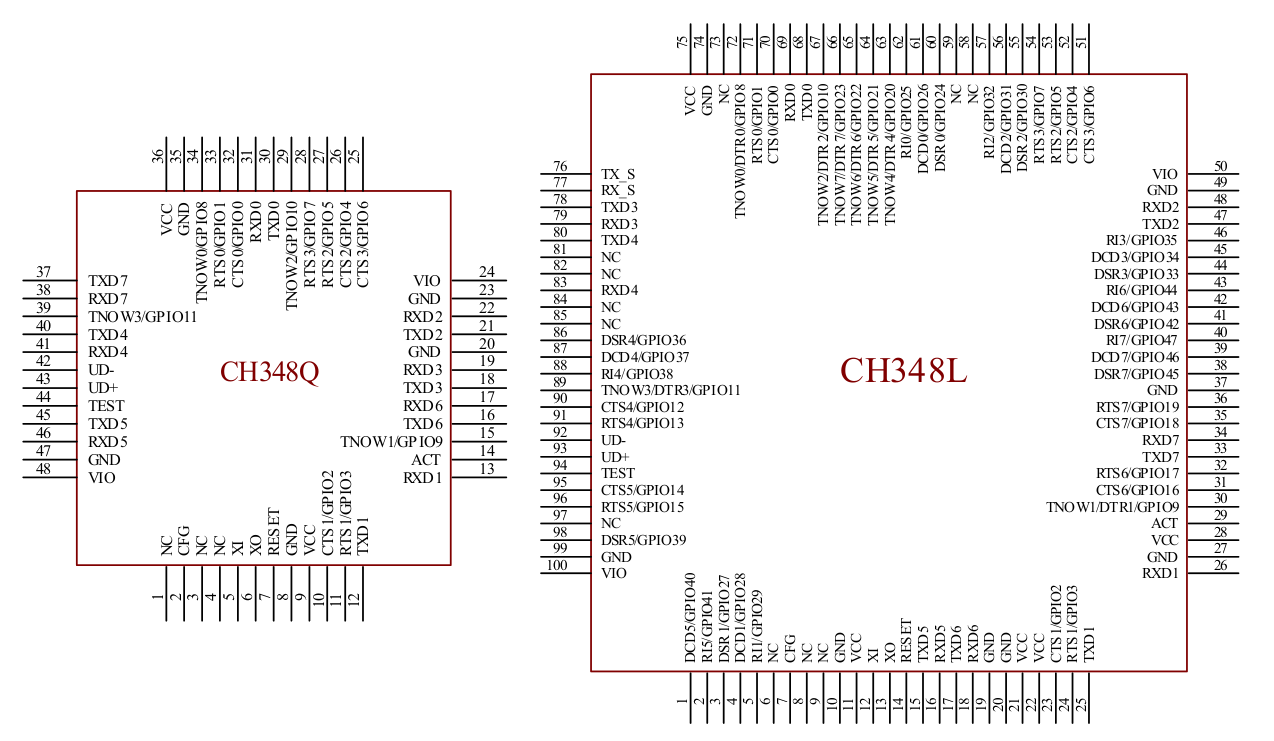WCH CH32V003 is a new ultra-cheap RISC-V microcontroller (MCU) clocked at 48 MHz with 2KB SRAM, 16KB flash, and a bunch of interfaces that sells for under 10 cents in quantities. The MCU offers up to eighteen GPIOs, UART, SPI, I2C, an 8-channel 10-bit ADC, and several timers in TSSOP20, QFN20, SOP16, or SOP8 packages, and a small development board is also available. WCH CH32V003 specifications: CPU – 32-bit “RISC-V2A” core up to 48 MHz Memory – 2KB SRAM Storage – 16KB flash Peripherals Up to 18x GPIO with interrupt support 1x USART interface 1x I2C 1x SPI 10-bit ADC up to 8 channels 1-Wire debug interface General purpose DMA controller Timers 16-bit advanced timer 16-bit general-purpose timer 2x watchdog timers 32-bit system timer Misc – 64-bit chip unique ID Supply voltage – 3.3/5V Low power modes – Sleep, standby Power on Reset (POR), programmable voltage detector Packages – TSSOP20, […]
$5 CH347 board is a USB 2.0 bridge to I2C, SPI, UART, JTAG, and GPIO
MuseLab USB-HS-Bridge is an inexpensive ($5) board based on WCH CH347 chip with a USB 2.0 Type-C interface that acts as a bridge for I2C, SPI, UART, and JTAG interfaces, as well as GPIOs. It’s notably useful to debug and download bitstreams to FPGA development boards, but it can also be used to connect various peripherals such as I2C sensors, SPI flash devices, UART devices to basically any host with a spare USB 2.0 host port. USB-HS-Bridge specifications: Chip – WCH CH347 high-speed USB to UART, I2C, SPI and JTAG chip (See link to the datasheet for details) USB – 1x USB 2.0 Type-C port with up to 480 Mbps data rate I/Os – 2x 16-pin header with 2x UART interfaces up to 9 Mbps baudrate 1x I2C for EEPROM or sensors 1x SPI master interface with 2 chip select signals to control up to 2x SPI slave devices. The […]
HydraUSB3 RISC-V MCU board combines USB 3.0 with HSPI and SerDes high-speed interfaces
Benjamin VERNOUX has launched the HydraUSB3 V1 board based on WCH CH569 RISC-V MCU as a developer platform to experiment with high-speed protocols like HSPI and SerDes through a USB 3.0 interface. It’s the third board from Benjamin we feature here, after the STM32-based HydraBUS and the HydraNFC v2 shield delivering up to 1600 mW for NFC charging and connectivity. The HydraUSB3 v1 is quite different since it does not involve NFC at all, and instead leverages the CH569’s high-speed interfaces including USB 3.0 (5 Gbps), HSPI (3.8Gbps), and SerDes (>1.2Gbps). HydraUSB3 V1 specifications: MCU – WCH CH569 32-bit RISC-V (RISC-V3A) RV32IMAC MCU @ 120MHz with 16KB 32-bit SRAM, 96KB configurable 128-bit SRAM, 448KB code flash, 32KB data flash USB – 1x USB 3.0 host/device port that supports the USB 3.0 SS built-in PHY (5Gbps) and USB 2.0 built-in PHY FS/LS/HS (480Mbps) High-speed I/Os High-Speed Parallel Interface (HSPI) up to […]
YD-CH32V307VCT6 RISC-V MCU board comes with Ethernet and plenty of I/Os
At the beginning of the year, we wrote about WCH CH32V307 RISC-V microcontroller and a development board with 8 UART ports controlled over Ethernet. I’ve now been informed of a similar, but much more compact by VCC-GND Studio named “YD-CH32V307VCT6”. Besides the 144 MHz RISC-V microcontroller, the board features a 10Mbps Ethernet port, two USB Type-C ports, SPI flash, EEPROM, a microSD card socket, and four rows of 24 pins each for a total of 96 pins exposing all pins out of the LQFP100 package. YD-CH32V307VCT6 board specifications: MCU – WCH CH32V307VCT6 32-bit RISC-V microcontroller @ 144 MHz with 256K Flash, 64K SRAM Storage – 32Mbit SPI NOR flash (W25Q32), 64kbit EEPROM (24C64), MicroSD card slot Networking – 10 Mbps Ethernet USB – 1x USB 2.0 Type-C port (High Speed: 480 Mbps), 1x USB 2.0 Type-C port (Full Speed: 12 Mbps) Expansion – 2x 48-pin headers with 2 x 12-bit […]
CherryUSB – A lightweight USB device/host stack for embedded systems
CherryUSB is a lightweight open-source USB device/host stack for embedded systems with one or more USB interfaces. The stack implements various class drivers such as CDC, HID, MSC, audio, video, and so on. It’s apparently part of Boufallo Lab SDK (e.g. for BL702 MCU), and has been ported and tested with WCH CH32V307 RISC-V MCU, STMicro STM32F4, and Nuvoton NUC442 Cortex-M4 microcontroller, as well as a two Arm Cortex-M3 microcontrollers I’ve never heard of: EastSoft ES32F3 and MindMotion MM32L3xx. CherryUSB device stack highlights: Support for USB2.0 full and high speed Endpoint irq callback USB classes support Composite Device Communication Device Class (CDC) Human Interface Device (HID) including “Custom HID” Mass Storage Class (MSC) USB VIDEO Class (UVC1.0,UVC1.5) USB AUDIO Class (UAC1.0, UAC2.0) Device Firmware Upgrade CLASS (DFU) MIDI CLASS (MIDI) Test and Measurement CLASS (TMC) Vendor class Remote NDIS (RNDIS) support Support WINUSB 1.0,WINUSB 2.0 with BOS (Binary Device Object […]
PikaScript – A lightweight Python implementation that runs on STM32 and other low-end MCUs
PikaScript is an ultra-lightweight Python engine that can run on microcontrollers with as little as 4KB of RAM and 32KB of Flash, while the more popular MicroPython requires at least 256kB of code space and 16kB of RAM. PikaScript was initially developed to run on STM32G030C8 and STM32F103C8 MCUs, meaning, for example, it works on the BluePill board, but it has also been ported to other platforms like WCH CH582 RISC-V MCU, WinnerMicro W806 C-Sky microcontroller, as well as other like Raspberry Pi RP2040, ESP32-C3, etc… but those are not quite as well supported with some features missing. PikaScript also permits the binding C function to a Python module through Pika Pre-compiler. PikaScript can run bare metal on the microcontroller, but also supports real-time operating systems such as RT-Thread and VSF (Versaloon Software Framework), as well as Linux. Just like MicroPython, it’s using a subset of Python 3, but I’d […]
WCH CH343 USB to serial chips support 1.8V to 5V IO voltage, 6 Mbps baud rate, custom VID/PID
WCH CH340 family of USB to serial chip is very popular, and often found on development boards for debugging/access to the serial console, but the company has now introduced the CH343 “Gen3” chip – just like CH9102F apparently – with a higher 6 Mbps baud rate, support for 1.8V, 2.5V, 3.3V, and 5V IO voltage, and the ability to request custom USB VID/PID numbers. Three variants exist with CH343P, CH343G, and CH343K with different packages: QFN16, SOP16, and ESSOP10 respectively. CH343P contains an EEPROM for easy customization, while CH343G and CH343K PID/VID can still be customized for larger orders. CH343 key features and specifications: Full-speed USB 2.0 device interface Hardware full-duplex serial UART interface with baud rate varies from 50bps to 6Mbps. Automatic identification and dynamic adaptation of common communication baud rate of 115200bps and below. Supports 5, 6, 7, or 8 data bits, as well as odd, even, space, […]
WCH CH348 is an 8-port USB to serial chip with up to 48 GPIOs
If you need to control or debug multiple devices over UART devices, you’d be glad to learn WCH has just launched the CH348 USB to serial chip with eight UART ports. Two models are offered CH348L in an LQFP100 package and CH348Q in an LQFP48 package. Both offer eight UART interfaces, but CH348L comes with more CTS/RTS and DTR/hardware flow control signals, as well as DTR, DCD, RI signals, and support for independent voltage for I/Os. CH348 key features specifications: High-speed USB device interface Hardware full-duplex serial port, integrated independent transmit-receive buffer Baud rate varies from 1200bps to 6Mbps. The serial ports support 8 data bits, odd, even, and none parity, 1/2 stop bit. Each serial port comes with a 2048-byte receiving FIFO and a 1024-byte transmitting FIFO. Signals RTS, DTR, DCD, RI, DSR, and CTS supported for hardware flow control The MODEM interface signal pins and 485 transmit and […]


